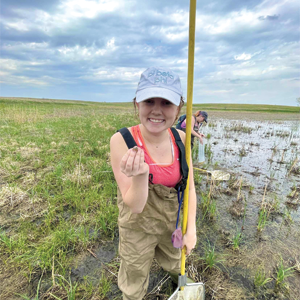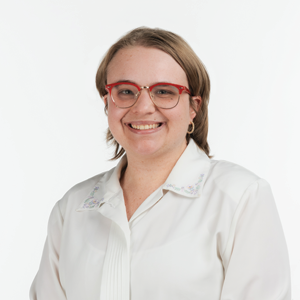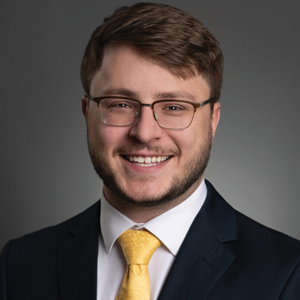Undergraduate Researchers Gain Experience and Insight

Ella Wittmuss’ path to becoming a medical doctor includes the well-traveled route of stellar grades and outstanding extracurriculars. In the summer of her sophomore year at the University of South Dakota, however, the medical biology major and Honors student added an unexpected detour to her journey.
“Never in my life did I think I would be putting on waders and going out into wetlands with a big net to catch frogs,” Wittmuss said. “But that’s exactly what I did.”
While not normally a waders-and-wetlands type, Wittmuss was an enthusiastic participant in the field work that contributed to a study on how stressors influence hormones in the Northern Leopard Frog.
Originally from Vermillion, Wittmuss finished her senior year this spring with an Honors thesis on her research findings (see below). These results, along with those of student researchers from across USD, expand our knowledge and understanding about the world. The students, in turn, gain practical experience and insight into the research process. They may also acquire a new understanding of themselves that will resonate long after graduation.
For Wittmuss, some of the lessons were practical, like when she learned that hatching frog larva from eggs in the lab is easier than wading through water and setting traps with leafy greens. (“Tadpoles like spinach,” she said.)
Perhaps more important are the personal and professional insights gained into the research process. Wittmuss’ experiences taught the budding scientist that setbacks are normal, expected and even useful.
One such discovery involved the process of collecting and measuring the hormone at the heart of her study – corticosterone.
“It’s hard to collect corticosterone in a way that doesn’t already stress out the organism. You can’t do it without the data being skewed,” said Wittmuss, who is continuing her research this summer as she prepares to enter USD’s Sanford School of Medicine in August.
“But we learned a lot along the way,” she added. “Now we’ll have to try a different way of collecting corticosterone.”
Jacob Kerby, Ph.D., professor and chair of the Department of Biology and Wittmuss’ faculty mentor, said most of the students who work in his lab are comfortable with the setbacks inherent in research.
“I think high-achieving students encounter failure and know how to overcome it,” he said. “Sometimes things fail because of insufficiencies. We’ve had things fail because of HVAC issues. It just happens, and you have to deal with it.”
On the other hand, a project might not have yielded the expected results but revealed something even more exciting.
“Scientists can be really happy when something doesn’t go as expected,” said Kerby. “I’ve had students come to me with a failed experiment and the results were a lot more interesting than the initial hypothesis. That gives students a deeper understanding of science, where there is a lot of discovery and exploration and thinking about things differently.”
Kerby often helps the students recruited for his lab in reassessing their initial research goals.
“The bigger challenge for them is biting off more than they can chew,” he said. “They come in with all sorts of big ideas, and I have to tell them, ‘You’re just going to do this tiny little thing and it’s going to take a lot more time than you think it’s going to take.’”
Learning how to overcome obstacles and set realistic goals benefits not only student researchers in the physical sciences but also those in the social sciences, humanities and other disciplines.
Research Process Teaches Resiliency, Critical Thinking
El Branham, a senior Honors student majoring in criminal justice studies and legal studies, didn’t have to wade through water catching tadpoles while working on a study of internal affairs departments within U.S. police departments (see below). She did, however, sift through hundreds of websites to get contact information at police departments and then help evaluate the data received from returned surveys.
While she initially anticipated boredom with the study’s repetitive tasks, her attitude quickly changed.
“I loved it, frankly,” said Branham, who is originally from Baltic, South Dakota. “Even combing through police department websites was more interesting than it should have been. You can see how different departments build their websites and what that says about the department more broadly.”
Performing this work as a research assistant to Thomas Mrozla, Ph.D., associate professor of criminal justice studies, Branham sharpened her collaboration and writing skills. Learning patience was another benefit, she added.
“When you’re waiting for survey results, you can’t do anything to make that happen faster,” Branham said. “As a person who likes to have things happen on my time, it was really frustrating for me. I had to learn to cope with that.”
Both Branham and Wittmuss were among the 11 students from South Dakota public universities to present posters of their research at the annual South Dakota Student Research Poster Session at the Capitol Rotunda in Pierre last February.
At the session, legislators and government officials chatted with students about their research. Some spoke about how research informs their policy making, Branham said.
“It was fulfilling to be able to see how research can affect the real world in a way that’s not always obvious when you’re an undergraduate just working with data,” she added.
Speaking of data, Branham said working with Mrozla helped her make sense of results and graphs produced by data analysis tools. “I’m not the best with numbers, but Dr. Mrozla was fantastic at helping me out.”
Developing an understanding of the story behind the data is one of the chief benefits of undergraduate participation in research, Mrozla said.
“I think the benefits are to gain hands-on experience on how knowledge is created and consumed,” he said. “A lot of people who make important decisions are not information literate, so part of our job is helping our students become better equipped to make decisions.”
Mrozla leads by example when it comes to encountering the setbacks inherent in research’s trial-and-error approach.
“When we encounter errors, I try to model positivity, resilience and a growth mindset. There’s probably another way to do something, and it isn’t the end of the world if something doesn’t work out or if a journal rejects it,” he said.
Each year, Mrozla said he aims to have one or two research assistants helping advance their own projects or his research, which focuses on police accountability and public perceptions of law enforcement.
“My approach with undergraduate research assistants is to find out where they are with their knowledge about the research process and go from there,” he said. “If the project is their own, I give them as much independence as possible while providing support and mentorship along the way.”
He sees his role as a coach who encourages students’ critical thinking skills and builds their confidence.
“Whether they are learning to conduct a literature review, create a survey, manage data, interpret findings or present at a conference, I want them to feel capable at each stage,” he said.
Research Reveals Professional Path for Alumnus
One recent USD alumnus said his undergraduate research gave him the experience and confidence to serve as the public policy manager for the Greater Sioux Falls Chamber of Commerce.
“One of the biggest benefits of going to USD was to have firsthand research experience,” said Aaron Vlasman, B.A.’22, political science and criminal justice studies graduate. Originally from Watertown, South Dakota, Vlasman had participated in speech and debate in high school, where he enjoyed prepping for tournaments with hours of online research. “But I had never been part of an actual, dedicated research team,” he added.
That soon changed when Vlasman joined the student research groups at USD’s Government Research Bureau and the Allene R. Chiesman Center for Democracy, both part of USD’s Department of Political Science (see below).
In these organizations, he worked on projects that included polling South Dakota voters on issues such as Medicaid expansion, examining the role of motherhood as an identity for women in Congress, and exploring the benefits and challenges of working with student researchers as part of a research team.
These studies introduced Vlasman to the world of quantitative analysis software, such as R and Stata, that can analyze and display data in a graphic format – skills he draws on frequently at his current job.
“The whole point of research is to tell your story,” he said. “If you don’t know how to display data properly and efficiently, then you won’t reach your goal.”
Like Branham, Vlasman said the nature of academic research requires a particular type of patience.
“I call it academic patience,” he said. “We can work really hard and then there will be a month-long waiting period because we don’t have what we want, or we know what we want but we’re not sure how to get there.”
Co-authoring a book chapter on working with a student research team – with Julia Hellwege, Ph.D., associate professor of political science, and other students – gave Vlasman ample opportunity to practice being patient during the revision and feedback stage. It also provided the chance to polish his writing skills.
These experiences benefited him in his public policy work at the Greater Sioux Falls Chamber of Commerce. Presenting research findings to multiple groups prepared Vlasman for communicating policy issues to the chamber’s board and its 1,800 members. Helping with political polling as a researcher in USD’s Government Research Bureau set him up to perform regular polling of chamber members.
“Learning how to create a poll, ask the right questions, clean the data and present the results were all things I learned at USD,” he said.
Research Remains a Priority at USD
USD recognizes the importance of student engagement in research. “Students can really find their passion as a scholar,” said Daniel Engebretson, Ph.D., vice president for USD’s Office of Research and Sponsored Programs. “We have so many signature opportunities for our students to get involved in research and creative scholarship as early as their first year.”
One way USD fosters student engagement with research is through financial support. Council for Undergraduate Research and Creative Scholarship mini-grants and the U.Discover Summer Scholarship program fund student research activities and travel to present findings at conferences.
Each year, USD also holds a two-day event called IdeaFest to showcase scholarly work by undergraduate and graduate students, and this year USD held its inaugural University Research Week to expand those efforts. The university’s Undergraduate Research and Creative Scholarship Awards are another source for funding research, travel and other expenses.
Ella Wittmuss, B.S. ’25, medical biology
Research: Wittmuss measured the effect of multiple, combined environmental stressors on levels of the hormone corticosterone in the Northern Leopard Frog (with doctoral student Danielle Galvin and biology professor Jacob Kerby, Ph.D.). Corticosterone plays a crucial role in amphibian development, so increases in this hormone’s levels at the larval stage could affect development and cause decreased mass. In this study, the research team exposed tadpoles to a naturally occurring element found in fertilizer called selenium, the chytrid fungus (which causes a devastating disease in frogs) and varied temperatures to simulate climate change.
What’s next? Attending USD’s Sanford School of Medicine this fall.
El Branham, B.A. ’25, criminal justice studies and legal studies
Research: As a research assistant to Thomas Mrozla, Ph.D., associate professor of criminal justice studies, Branham helped identify and gather information from police departments with more than 100 officers to study the police officers who work in internal affairs offices. The research focuses on internal affairs officers’ backgrounds, their workload and levels of autonomy, job satisfaction and stressors related to the job. In addition to serving as a research assistant, Branham also designed her own research study as the basis for her senior Honors thesis. She surveyed and interviewed primarily pre-law and law students on their perceptions of legal responsibilities under Title II of the Americans with Disabilities Act, which prohibits discrimination on the basis of disability by state and local governments.
After graduation? Starting law school in fall 2025.
Aaron Vlasman, B.A. ’22, political science and criminal justice studies
Research: Vlasman participated in numerous undergraduate research projects at USD. He even co-authored a chapter (with other students and Julia Hellwege, Ph.D.) in the academic book “Aligning Teaching and Research: Work Smarter, Not Harder.” Their chapter provided lessons for faculty members working with student research teams. He also assisted Hellwege with her research on working mothers in the U.S. Congress. Through USD’s Government Research Bureau, Vlasman helped perform polling of South Dakota residents on several issues.
Current job: Public Policy Manager, Greater Sioux Falls Chamber of Commerce






